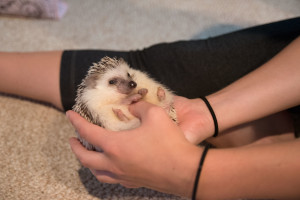Ithaca College has strict rules against having pets on campus, as do some off-campus landlords, but students are finding their way around the rules rather than leaving their pets at home.
The only pets the college permits students to have are fish, as long as they are in a tank no larger than 10 gallons. Exemptions to this rule are animals being used for research, police dogs, service animals, support and comfort animals under certain circumstances, and pets that residence directors own, according to the college’s policies.
Comparatively, Quinnipiac University, Elon University and Drake University also have the same guidelines: no pets unless it is a fish in a tank of less than 10 gallons. Therapy animals are allowed at Quinnipiac as long as they are approved by Quinnipiac’s Student Health Services.

At the college, whenever a pet is found, the student is given a judicial violation. The violation is documented, and then the student has to go through the college’s judicial system, Bonnie Prunty, director of the Office of Residential Life and Judicial Affairs, said. Students are then given a date to get the animal off the premises. Prunty said students usually get until the end of the week that the animal is found to find it a new home. If the animal has not been removed by the given date, further judicial action is taken against them, Prunty said.
Prunty said finding illegal pets on campus is “not uncommon,” and most of the pets they find are in the Circle Apartments. Prunty said five pets were found in the 2013–14 school year and 12 pets were found in the 2014–15 school year. She said she is not sure what caused the number to increase.
“[Resident assistants] have certainly been told to be vigilant for unapproved animals,” Prunty said. “Our staff will continue to watch for unapproved animals when they do health and safety inspections as well as closing inspections at breaks.”
A student named Kayla* said hiding a pet from Residential Life is not hard. Kayla, who currently lives in Circles, said she bought a kitten named Rengar over the summer to help with her anxiety during the school year. She made sure a friend off campus could look after Rengar for a couple of days when room checks were scheduled.

Amanda den Hartog/The Ithacan
She said she is planning on getting Rengar approved as a support and comfort animal, but for the time being, and because the process of getting an animal approved is extensive, Kayla is owning Rengar illegally.
Kayla said having the responsibility to take care of a pet helps her emotionally.
“Having a pet that depends on me helps me keep myself calm,” she said.
Rose* lived in the Circle Apartments last year with her hedgehog, Hercules. Now she lives off campus, where her landlord is unaware of Hercules. Like Kayla, she also said it was easy to hide Hercules from any suspecting RAs while she lived in Circles — she would send him to her boyfriend’s house when she expected a room check.
“He’ll lay on me and fall asleep on me — and he cuddles. He loves to climb around,” Rose said.
However, she also said having a pet, especially while in college, is a big responsibility, and freshmen and sophomores should not have pets because of the burden.
Another student, Sarah*, a sophomore, is living in the Garden Apartments and said her dwarf hamster, Tiny Smalls, is so quiet that no one knows he is there. She said she’d had him for a week and a half.
“While [an RA] evaluated the area, I just put him under the bed,” Sarah said. “He sleeps during the day, so he’s not noisy at all.”

Molly*, a senior, owns a mini lop rabbit named Gretel with her roommates. Molly lives off-campus, but her landlord is unaware of her pet because pets are not allowed in the house. If an animal is found, according to her lease agreement, there is a $400 fine each day the animal stays in the house.
“We just blatantly ignore [the rules],” Molly said. She said having an animal in the house is worth it because of the comfort Gretel provides her.
Molly adopted Gretel from the Tompkins County Society for the Prevention of Cruelty to Animals, which has strict rules that a pet cannot be adopted if pets are not allowed in the building of the owner. Pam Stonebraker, associate director of the Tompkins County SPCA, said they call the landlord of the building and, in some cases, the parents of student adoptees. Molly said she managed to work around the SPCA’s adoption procedures: On the adoption papers, she put down her friend’s phone number for the landlord’s contact.
Prunty said the reason there cannot be pets on campus is because of students being allergic to certain animals, the wear and tear an animal can do on a facility and the fact that some students are afraid of certain animals, which could cause other students anxiety.
Prunty said students need to be conscious of the damage an animal could do to the school and to fellow students, but also to be thoughtful toward their pet. She said she wants students to understand that if an animal is found, it has to be moved off campus, which could put unhealthy stress on the animal.
“Students need to think about the well-being of the animal,” Prunty said.
However, Kayla said the rules should be changed.
“I know of a lot of people with hamsters or bunnies that aren’t going to do damage to residence halls,” she said.
She said students should be able to handle small animals, especially if they can help with an emotional issue.
Rose said having a backup home to take a pet to is crucial.
“I would suggest if you don’t have another option for your pet, don’t get one,” Rose said.
*Names have been changed to protect students’ identities.
[acf field=”code1″]








